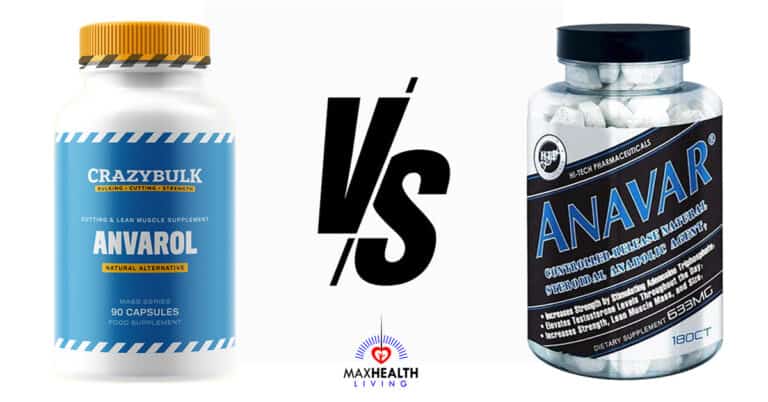Does Anavar Raise or Lower Cholesterol Levels?
Max Health Living is a reader-supported site. Purchases made through links may earn a commission. Learn more.
Anavar, also known as Oxandrolone, is a popular anabolic steroid that is commonly used to enhance athletic performance and promote muscle growth. However, one of the concerns associated with the use of Anavar is its potential impact on cholesterol levels.
While some studies suggest that Anavar may have a positive effect on cholesterol levels, others indicate that it could have a negative impact. So, does Anavar raise or lower cholesterol levels?
In this article, we will explore the evidence and try to answer this question.
Key Highlights:
- Anavar has been found to increase total and LDL cholesterol levels.
- Steroids increase cholesterol because they cause the body to produce more low-density lipoprotein (LDL) cholesterol, which is the “bad” cholesterol.
- At the same time, steroids reduce the production of high-density lipoprotein (HDL) cholesterol, which is the “good” cholesterol.
- This imbalance of cholesterol levels can lead to an increased risk of heart disease.
Anavar, also known as Oxandrolone, is an anabolic steroid that is commonly used to increase muscle mass and strength. It is also known to increase cholesterol levels in the body. This increase in cholesterol is because Anavar increases the production of low-density lipoprotein (LDL) in the body. LDL is the “bad” cholesterol that can lead to heart disease and other health issues. Anavar also increases the production of high-density lipoprotein (HDL), which is the “good” cholesterol that helps to reduce the risk of heart disease.
However, it is important to note that Anavar can also increase the risk of developing high cholesterol, so it is important to monitor cholesterol levels when taking Anavar.
Steroids have been shown to increase cholesterol levels through upregulation of hepatic low-density lipoprotein (LDL) receptor expression and inhibition of high-density lipoprotein (HDL) synthesis. This results in a significant increase in total cholesterol levels, which can have detrimental effects on cardiovascular health.
Can anabolic steroids cause high cholesterol?
Steroids can cause high cholesterol by altering the body’s metabolism of lipids (fats). Steroids increase the rate of production of low-density lipoprotein (LDL) cholesterol, which is the “bad” cholesterol.
At the same time, steroids reduce the rate of production of high-density lipoprotein (HDL) cholesterol, which is the “good” cholesterol. This imbalance between LDL and HDL cholesterol can lead to an increase in total cholesterol levels.
Steroids can also increase the production of triglycerides, which are a type of fat found in the blood. High levels of triglycerides can also contribute to high cholesterol levels. In addition, steroids can cause an increase in the production of very low-density lipoprotein (VLDL) cholesterol, which is a type of cholesterol that is associated with an increased risk of heart disease.
Moreso, steroids can cause an increase in the production of bile acids, which are substances that help break down cholesterol.
When bile acids are produced in excess, they can cause an increase in the absorption of cholesterol from the intestines, leading to an increase in total cholesterol levels.
It has been found to have a positive effect on lipids, including lowering total cholesterol, raising HDL (good) cholesterol, and lowering LDL (bad) cholesterol.
It also increases the size and number of low-density lipoprotein particles, which can help reduce the risk of cardiovascular disease. In addition, Anavar has been found to reduce triglyceride levels, which can help reduce the risk of developing diabetes. Anavar can also increase HDL levels, which can help reduce the risk of stroke and heart attack.
What is the safest anabolic steroid for cardiovascular health?
Anabolic steroids are synthetic hormones that can be used to increase muscle mass and strength, but they can also have serious side effects. When it comes to cardiovascular health, the safest anabolic steroid is Primobolan.
Primobolan is a mild steroid that has been found to have minimal cardiovascular side effects. It is a derivative of dihydrotestosterone, which is much less androgenic than other steroids. In addition, Primobolan does not aromatize, meaning it does not convert to estrogen in the body. This makes it less likely to cause water retention or high blood pressure, which can be dangerous for cardiovascular health.
Primobolan is also a good choice for those looking to increase muscle mass and strength, as it has been found to provide good results with minimal side effects. It is often used in cutting cycles, as it helps to preserve muscle mass while reducing body fat. It can also be used in bulking cycles, as it is known to increase lean muscle mass.
Overall, Primobolan is the safest anabolic steroid for cardiovascular health. It has minimal side effects and can provide good results for those looking to increase muscle mass and strength.
No, Anavar does not increase blood pressure. It may even help to reduce it in some cases. Studies have shown that Anavar can reduce systolic and diastolic blood pressure, and can also reduce cortisol levels. However, if you eat like a pig or gain too much weight, you might suffer from hypertension.
What is the safest steroid for the heart?
It is important to note that any use of steroids, even the so-called “safest” ones, can potentially have negative effects on the heart. However, some steroids are considered to be less harmful than others. Among the steroids that are considered to be safer for the heart are Anavar (Oxandrolone), Primobolan (Methenolone), and Winstrol (Stanozolol).
These steroids are known to have a relatively low impact on blood pressure and cholesterol levels, which are two major risk factors for heart disease. However, it is important to remember that the use of any steroid can still have potential risks and should always be done under the guidance of a medical professional.
Important Disclaimer: The information contained on MAX HEALTH LIVING is intended for informational and educational purposes only. Any statements made on this website have not been evaluated by the FDA and any information or products discussed are not intended to diagnose, cure, treat, or prevent any disease or illness. Please consult a healthcare practitioner before making changes to your diet or taking supplements that may interfere with medications.
Who We Are

We are a team of fitness, health, and supplement experts, and content creators. Over the past 4 years, we have spent over 123,000 hours researching food supplements, meal shakes, weight loss, and healthy living. Our aim is to educate people about their effects, benefits, and how to achieve a maximum healthy lifestyle. Read more.










